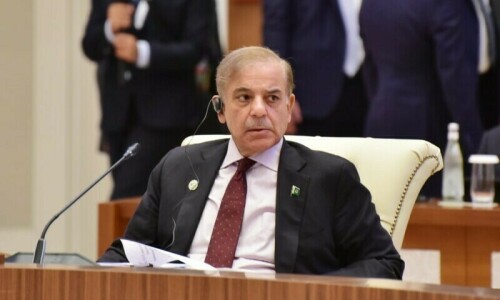LAHORE, March 15: Social and educational inequalities, the lack of language skills, racism, integration and isolation issues, as well as the lack of representation are the problems of the minorities in Europe, according to Prof Jamal Malik, Religious and Islamic Studies chairman at the University of Erfurt, Germany.
Religion was not the basic problem being faced by the minorities in Europe, said Prof Malik while delivering a lecture on ‘Beyond multiculturalism? The current integration debate in Germany and the UK’ organised by the Punjab University history department and the Pakistan Study Centre on Saturday.
He said the patterns of dialogue must be developed constantly within the contexts of conflicts that stem from socio-economic causes, rather than stiffening the increasingly confessionalised discourse.
He said there was a need to understand the “other” by broadening and extending the dialogue beyond the realm of religious and confessional lines.
In order to curb the problem of ‘othering’ and making dialogues more meaningful, Prof Malik emphasised that there was a need to reformulate the discourse surrounding the issues of minorities in Europe that include religious as well as non-religious groups and enable them to participate in intercultural dialogue.
He said the process of societal integration and religious pluralism in Europe and Germany was highlighted by three ideas: the existence of religious pluralism was questioned because alternative options were marginalised in singularisation of the church; Europe was considered to be singular in its quest for secularism and had a monopolistic claim to modernity; and the programmatic for a unified Europe after World War-II was to be provided by political Catholicism. “The genealogical affiliation of these ideas to the European history exclusively echoed in powerful statements by both the politicians and the scientists,” he said.
He said there was a contesting variety of Muslim cultural articulation in Germany. Initially, he said, Muslims were strictly organised on ethnic and national lines, the backyard mosque being a centre for the memorisation of ethnicity and endowed with migrant-specific features.
He said most of the immigrants were unskilled and uneducated workers without any command of German language and entered into a lower strata of the German society and marginalised by residential segregation. He said Islam had become synonymous with poverty and the lack of civility and political parties were only willing to support Muslims for election. Yet, he said, long-term and efficient solutions, particularly in education and labour market were denied. Instead, Muslims and Islam became an issue of internal security in contrast to Christian tradition considered to be peaceful and determining.
Owing to these factors, Prof Malik said, over three million Muslims living in Germany faced serious discrimination and cultural biases. He said Islam was inherently pluralistic, adding that the Western media had projected it as fundamentalist and aggressive. He said that these stereotyped images were flashed so constantly that this had led to the rise of extremism and Islamophobia in Europe and North America.
He said the Muslims and the West should focus on interfaith dialogue and mutual understating leading to the alliance of civilisations. "All religions need equal recognition and the boundaries between religion and politics have to be re-negotiated.
PU history department chairman Prof Dr Qalb-i-Abid also spoke.













































Dear visitor, the comments section is undergoing an overhaul and will return soon.